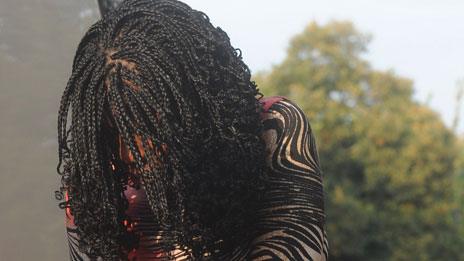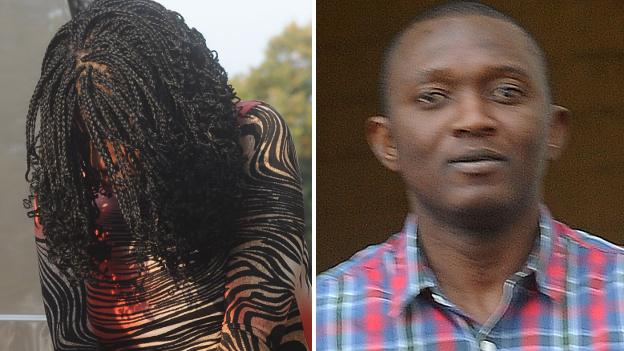Sex trafficking trial: Accused denies beating victims
- Published

Lizzy Idahosa said she was expecting the child of her co-defendant, Jackson Omoruyi
A woman accused of trafficking two Nigerian women to become sex workers in the UK has told a jury she never threatened or beat either of them.
It is claimed the pair were forced to work in brothels to repay Lizzy Idahosa £50,000 for travel and false documents.
Ms Idahosa, 24, denied threatening them about repaying the cash.
She has pleaded not guilty to charges including trafficking for prostitution. Her partner Jackson Omoruyi is also on trial at Cardiff Crown Court.
He denies three charges of inciting the women to become prostitutes and transferring criminal property.
Ms Idahosa told the court she had sent money to Nigeria on behalf of the women, who are in their 20s and cannot be named for legal reasons.
She said she never knew that their money had come from prostitution and told the jury she thought it may have come from their boyfriends.
'Ashamed and worried'
She also gave details about her relationship with her co-defendant Mr Omoruyi, 41.
The pregnant defendant said he was her boyfriend and was the father of her child and her unborn baby.
She said they met around 2011 when they heard each other speaking the same language. They started as friends before developing a relationship while living in different parts of the UK.
Ms Idahosa said she had never told Mr Omoruyi that she had worked as a prostitute, adding she was ashamed and worried he would leave her.
He first learnt of her past when she was arrested, she told the court.
She claimed she had lent him money and paid it into his account.
She also said that she had given his bank details to others for them to pay money into the account, and that money would then be passed on to her.
'Magic' rituals
Under cross examination from the prosecution, Ms Idahosa said that she had no idea about the lives of the two women in Nigeria and no idea if they went through ritualistic "juju" ceremonies - sometimes known as voodoo or magic - to swear an oath of secrecy.
She told the court she had little knowledge of such rituals.
Prosecutor Caroline Rees questioned whether the defendant was trying to distance herself from such ceremonies, because that was what had been used in order to "buy the silence" of the women allegedly trafficked.
"That's not true," said Ms Idahosa.
The trial continues.
- Published6 October 2014

- Published23 September 2014
